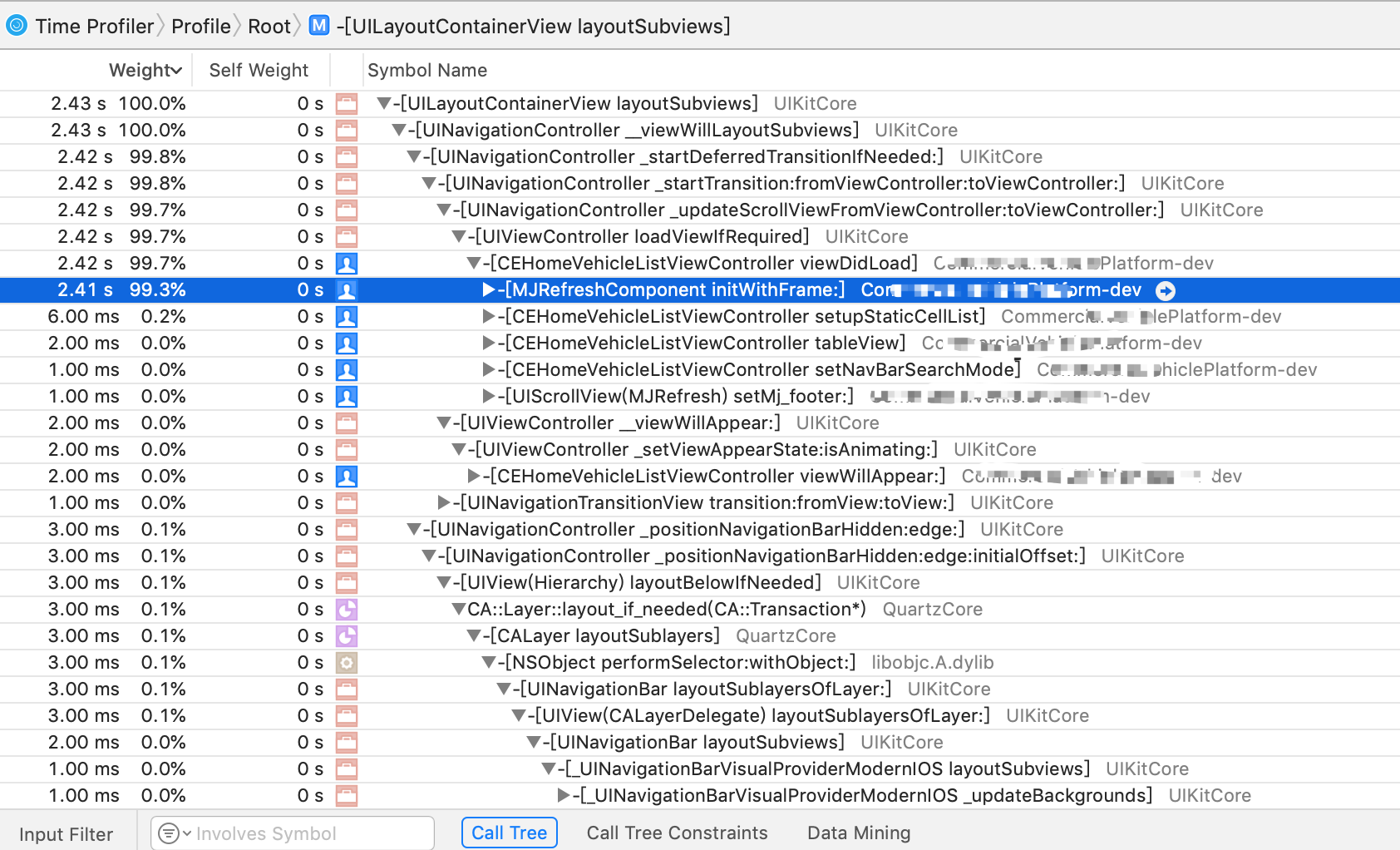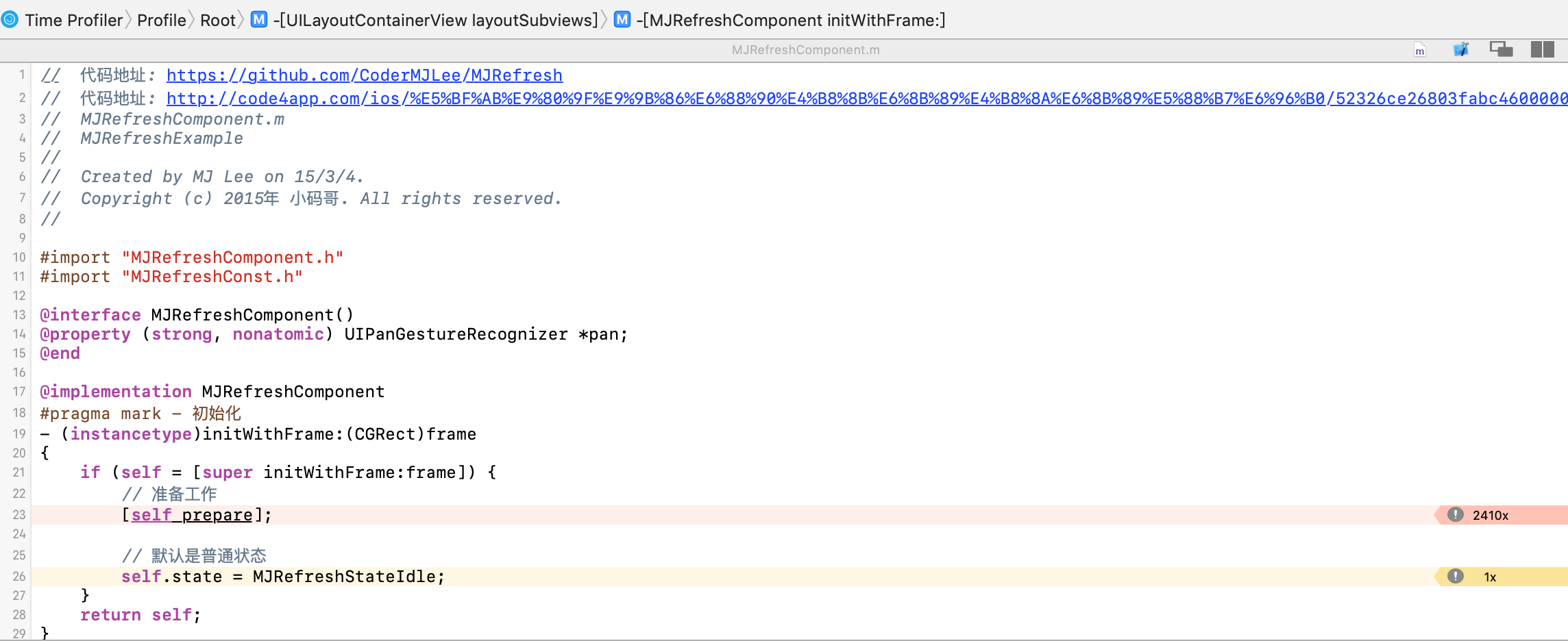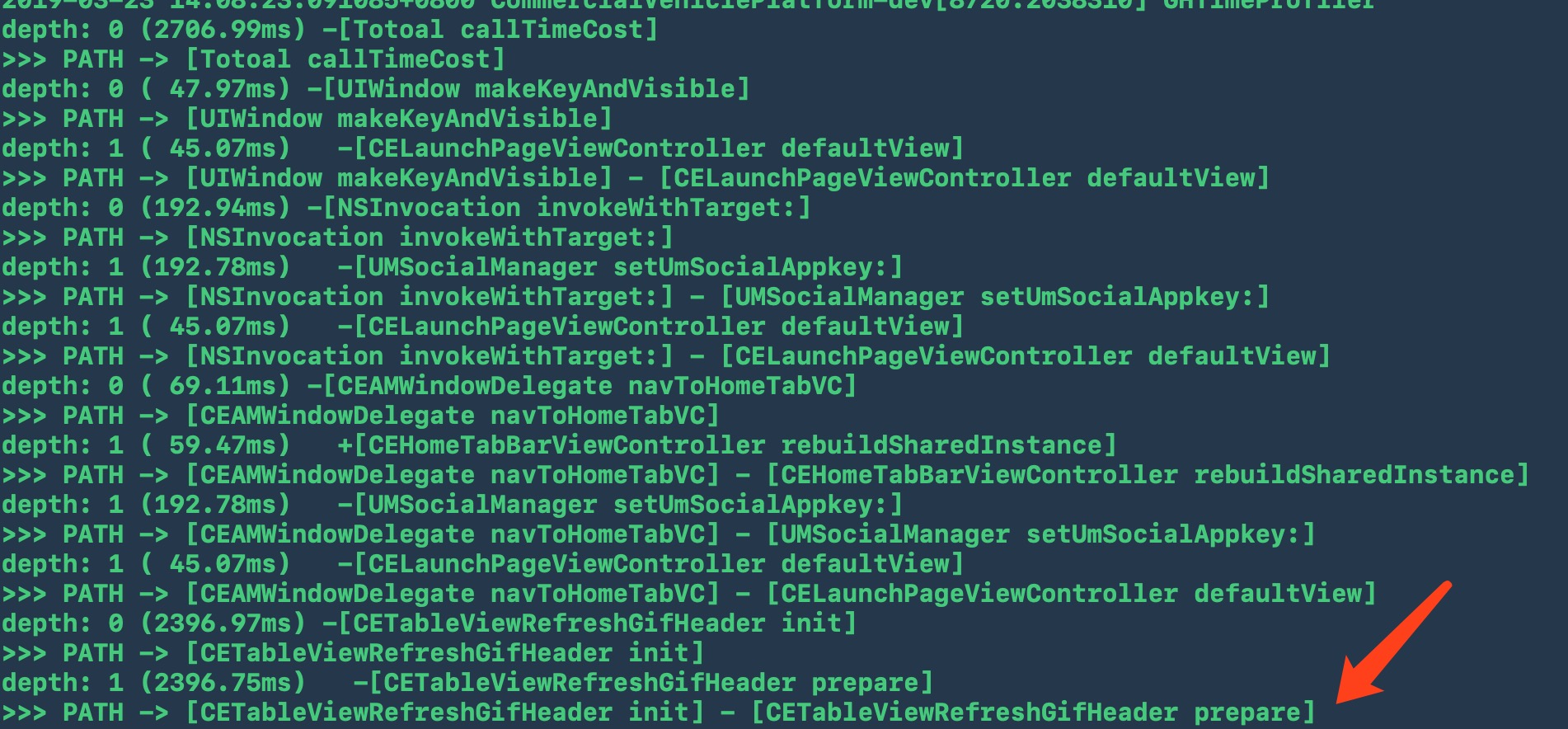找出那个拖后腿的凶手
前言
主线程耗时是一个App性能的重要指标。主线程阻塞,立马会引起用户操作的卡顿,这是最直接的反应,所以是我们必须关注的一个性能点。
检测方案
Instrument - Time Profiler
Time Profiler模板使用Time Profiler工具对系统CPU上运行的进程执行低开销,基于时间的采样,显示App对多核CPU和线程的使用情况。
随着时间的推移,使用多个核心和线程的效率越高,App的性能就越好。
不熟悉的同学,可以参考官方文档Track CPU core and thread use
你需要在用Time Profiler之前,需要开启生成dSYM符号文件,否则你只能看到系统函数的调用。
Debug模式,默认不会生成dSYM符号文件。
需要在Build Setting > Debug Infomation Format 选项中,为Debug开启dSYM文件的生成。
然后启动Xcode,build当前项目。
再打开Instrument,选择Time Profiler模板,开始录制。
Time Profiler中会记录每个线程中的函数调用关系树,使我们更容易定位到是哪一段代码导致了线程的阻塞。

双击这条记录,就能看到这段代码的源码

OK,到此为止,Time Profiler就介绍到这里,几乎都是UI界面,大家很容易就能使用了。
那说说Time Profiler的缺点
- 检测时,必须有Xcode支持。
- 真机检测时,必须处于联机状态。
- 无法实现自定义的输出内容。
自制检测工具
Time Profiler虽然好用,但也有局限性,这时自己搭建一套检测工具,想必是大家都会想的事情。
这个检测工具的功能可以参照Time Profiler
- 函数调用的关系树
- 通过配置对统计数据进行筛选
- 捕获的函数尽可能的多
- 格式化输出统计数据
- 统计数据日志化管理,上传到服务器
开始我也是从Method Swizzle思路出发,对UIViewController、UIView的耗时进行了,可惜仅仅这么做的话,统计的颗粒度太粗了,实际用起来并不好。
hook objc_msgSend函数会是个更好的选择。我查阅了objc4的源码后,发现会涉及到对C库的Hook,以及使用汇编语言对objc_msgSend实现的重写,线程的局部存储。
好在,iOS发展到现在,已经有很多的大神给我们提供了轮子,比如我这找到了戴铭老师的轮子进行二次封装。

我的项目还没整理完,不过实现原理基本借鉴了戴铭老师的设计,大家可以参考他的项目搭建自己的统计系统。
借鉴的项目地址:GCDFetchFeed
C库的hook用的是FaceBook的fishhook,我就不多介绍了,这个大家应该耳熟能详了吧。
此次封装涉及文件:
SMCallTrace.h SMCallTrace.m SMCallTraceCore.c SMCallTraceCore.h
我对hook objc_msgSend方法的主要实现部分进行了代码注释,希望能帮助大家理解,hook是如何完成的。
//
// GHObjcMsgSendHook.c
// CommercialVehiclePlatform
//
// Created by JunhuaShao on 2019/3/17.
// Copyright © 2019 JunhuaShao. All rights reserved.
//
/********************************************************
objc_msgSend Hook代码来源:https://github.com/ming1016/GCDFetchFeed
线程局部存储:https://blog.csdn.net/vevenlcf/article/details/77882985
********************************************************
*/
#import "GHObjcMsgSendHook.h"
// 此Hook只支持arm64架构
#ifdef __aarch64__
//#import <objc/runtime.h>
//#import <sys/time.h>
//
//#import <pthread.h>
#include <stdio.h>
#include <stdlib.h>
#include <string.h>
#include <stddef.h>
#include <stdint.h>
#include <sys/types.h>
#include <sys/stat.h>
#include <sys/time.h>
#include <objc/message.h>
#include <objc/runtime.h>
#include <dispatch/dispatch.h>
#include <pthread.h>
#import "fishhook.h"
/**
Configuration
*/
// 调用记录工具开关
static bool _call_record_enabled = true;
// 设置最小耗时阈值,单位:微秒
static uint64_t _min_time_cost = 1000; //us
// 设置最大调用深度阈值
static int _max_call_depth = 3;
/**
iVar
*/
// 被替换的原objc_msgSend
__unused static id (*orig_objc_msgSend)(id, SEL, ...);
// 用于和调用线程关联的key,在开启工具时初始化
static pthread_key_t _thread_key;
// 格式化的耗时记录
static GHCallRecord *_ghCallRecords;
// 格式化的耗时记录占用空间
static int _ghRecordAlloc;
// 格式化耗时记录的个数
static int _ghRecordNum;
/**
被hook函数的调用记录
*/
typedef struct {
// 通过 object_getClass 能够得到 Class
id self;
// 通过 NSStringFromClass 能够得到类名
Class cls;
// 通过 NSStringFromSelector 方法能够得到方法名
SEL cmd;
// us 调用时间(微秒)
uint64_t time;
// link register 用于指定下一个函数的地址
uintptr_t lr;
} thread_call_record;
/**
线程中函数调用栈
*/
typedef struct {
// 当前被hook函数的调用记录
thread_call_record *stack;
// 当前存储空间大小
int allocated_length;
// 当前记录序号
int index;
// 是否在主线程上
bool is_main_thread;
} thread_call_stack;
/**
获得线程中的函数调用栈
@return 函数调用栈
*/
static inline thread_call_stack * get_thread_call_stack() {
/**
int pthread_setspecific (pthread_key_t key, const void *value)
用于将value的副本存储于一数据结构中,并将其与调用线程以及key相关联。
参数value通常指向由调用者分配的一块内存。
当线程终止时,会将该指针作为参数传递给与key相关联的destructor函数。
void *pthread_getspecific (pthread_key_t key);
当线程被创建时,会将所有的线程局部存储变量初始化为NULL。
因此第一次使用此类变量前必须先调用pthread_getspecific()函数来确认是否已经于对应的key相关联,
如果没有,那么可以通过分配一块内存并通过pthread_setspecific()函数保存指向该内存块的指针。
*/
thread_call_stack *cs = (thread_call_stack *)pthread_getspecific(_thread_key);
if (cs == NULL) {
// 为函数调用栈开辟空间
cs = (thread_call_stack *)malloc(sizeof(thread_call_stack));
// 为hook函数记录开辟空间,大小为128个记录大小
cs->stack = (thread_call_record *)calloc(128, sizeof(thread_call_record));
// 初始当前存储空间为64个记录大小
cs->allocated_length = 64;
// 初始化序号
cs->index = -1;
/**
int pthread_main_np(void); 如果在主线程上,会返回不为零的结果
*/
cs->is_main_thread = pthread_main_np();
// 将调用栈与线程关联
pthread_setspecific(_thread_key, cs);
}
return cs;
}
static void release_thread_call_stack(void *ptr) {
thread_call_stack *cs = (thread_call_stack *)ptr;
if (!cs) return;
// 释放调用栈
if (cs->stack) free(cs->stack);
free(cs);
}
static inline void push_call_record(id _self, Class _cls, SEL _cmd, uintptr_t lr) {
// 获得当前线程关联的调用栈
thread_call_stack *cs = get_thread_call_stack();
if (cs) {
// 序号增一
int nextIndex = (++cs->index);
// 如果序号超过了当前存储空间大小
if (nextIndex >= cs->allocated_length) {
// 将当前存储空间增长64个记录大小
cs->allocated_length += 64;
// 为指针重新分配调用栈的空间,为当前存储空间大小。
cs->stack = (thread_call_record *)realloc(cs->stack, cs->allocated_length * sizeof(thread_call_record));
}
// 获得当前序号对应的内存地址,创建新记录
thread_call_record *newRecord = &cs->stack[nextIndex];
// 记录调用对象
newRecord->self = _self;
// 记录调用class
newRecord->cls = _cls;
// 记录调用函数
newRecord->cmd = _cmd;
// 记录下一个调用函数地址
newRecord->lr = lr;
/**
当前线程为主线程,并且开启了调用记录功能。
目的是只统计主线程耗时
*/
if (cs->is_main_thread && _call_record_enabled) {
/**
Linux定义的timeval结构体
__darwin_time_t tv_sec; //seconds
__darwin_suseconds_t tv_usec; //and microseconds
tv_sec为Epoch到创建struct timeval时的秒数,
tv_usec为微秒数,即秒后面的零头。
这里用了高精度,所以对两者进行了相加,取了最近的100秒
*/
struct timeval now;
// 获得当前时间
gettimeofday(&now, NULL);
newRecord->time = (now.tv_sec % 100) * 1000000 + now.tv_usec;
}
}
}
static inline uintptr_t pop_call_record() {
// 获取当前调用栈
thread_call_stack *cs = get_thread_call_stack();
// 当前调用记录序号
int curIndex = cs->index;
// 父级函数调用记录序号
int nextIndex = cs->index--;
// 获取父级函数调用记录,出栈
thread_call_record *pRecord = &cs->stack[nextIndex];
// 同样是主线程,并且开启记录功能
if (cs->is_main_thread && _call_record_enabled) {
// 获取当前时间
struct timeval now;
gettimeofday(&now, NULL);
uint64_t time = (now.tv_sec % 100) * 1000000 + now.tv_usec;
// 如果当前时间小于上次记录的时间,则进位了,这里加上100秒
if (time < pRecord->time) {
time += 100 * 1000000;
}
// 获得耗时
uint64_t cost = time - pRecord->time;
// 耗时大于耗时阈值,调用深度小于最大深度,则进行记录。这里调用序号,即为深度
if (cost > _min_time_cost && cs->index < _max_call_depth) {
// 初始化格式化耗时记录
if (!_ghCallRecords) {
// 创建空间大小为1024个记录
_ghRecordAlloc = 1024;
_ghCallRecords = (GHCallRecord *)malloc(sizeof(GHCallRecord)*_ghRecordAlloc);
}
// 记录个数加一
_ghRecordNum++;
// 当前记录个数大于空间时,重新为指针分配内存,大小为比原来多1024个记录
if (_ghRecordNum >= _ghRecordAlloc) {
_ghRecordAlloc += 1024;
_ghCallRecords = (GHCallRecord *)realloc(_ghCallRecords, sizeof(GHCallRecord) * _ghRecordAlloc);
}
// 获取当前页数对应的地址,创建格式化记录。
GHCallRecord *log = &_ghCallRecords[_ghRecordNum - 1];
// 保存调用class
log->cls = pRecord->cls;
// 保存调用深度
log->depth = curIndex;
// 保存调用方法
log->sel = pRecord->cmd;
// 保存耗时
log->time = cost;
}
}
// 返回下个函数的调用地址
return pRecord->lr;
}
void hook_before_objc_msgSend(id self, SEL _cmd, uintptr_t lr)
{
// 函数调用记录入栈
push_call_record(self, object_getClass(self), _cmd, lr);
}
uintptr_t hook_after_objc_msgSend() {
// 函数调用记录出栈
return pop_call_record();
}
// replacement objc_msgSend (arm64)
// https://blog.nelhage.com/2010/10/amd64-and-va_arg/
// http://infocenter.arm.com/help/topic/com.arm.doc.ihi0055b/IHI0055B_aapcs64.pdf
// https://developer.apple.com/library/ios/documentation/Xcode/Conceptual/iPhoneOSABIReference/Articles/ARM64FunctionCallingConventions.html
#define call(b, value) \
__asm volatile ("stp x8, x9, [sp, #-16]!\n"); \
__asm volatile ("mov x12, %0\n" :: "r"(value)); \
__asm volatile ("ldp x8, x9, [sp], #16\n"); \
__asm volatile (#b " x12\n");
#define save() \
__asm volatile ( \
"stp x8, x9, [sp, #-16]!\n" \
"stp x6, x7, [sp, #-16]!\n" \
"stp x4, x5, [sp, #-16]!\n" \
"stp x2, x3, [sp, #-16]!\n" \
"stp x0, x1, [sp, #-16]!\n");
#define load() \
__asm volatile ( \
"ldp x0, x1, [sp], #16\n" \
"ldp x2, x3, [sp], #16\n" \
"ldp x4, x5, [sp], #16\n" \
"ldp x6, x7, [sp], #16\n" \
"ldp x8, x9, [sp], #16\n" );
#define link(b, value) \
__asm volatile ("stp x8, lr, [sp, #-16]!\n"); \
__asm volatile ("sub sp, sp, #16\n"); \
call(b, value); \
__asm volatile ("add sp, sp, #16\n"); \
__asm volatile ("ldp x8, lr, [sp], #16\n");
#define ret() __asm volatile ("ret\n");
__attribute__((__naked__))
static void hook_Objc_msgSend() {
// Save parameters.
save();
__asm volatile ("mov x2, lr\n");
__asm volatile ("mov x3, x4\n");
// Call our before_objc_msgSend.
call(blr, &hook_before_objc_msgSend);
// Load parameters.
load();
// Call through to the original objc_msgSend.
call(blr, orig_objc_msgSend);
// Save original objc_msgSend return value.
save();
// Call our after_objc_msgSend.
call(blr, &hook_after_objc_msgSend);
// restore lr
__asm volatile ("mov lr, x0\n");
// Load original objc_msgSend return value.
load();
// return
ret();
}
void ghAnalyerStart() {
_call_record_enabled = true;
static dispatch_once_t onceToken;
dispatch_once(&onceToken, ^{
pthread_key_create(&_thread_key, &release_thread_call_stack);
rebind_symbols((struct rebinding[6]){
{"objc_msgSend", (void *)hook_Objc_msgSend, (void **)&orig_objc_msgSend},
}, 1);
});
}
void ghAnalyerStop() {
_call_record_enabled = false;
}
void ghSetMinTimeCallCost(uint64_t us) {
_min_time_cost = us;
}
void ghSetMaxCallDepth(int depth) {
_max_call_depth = depth;
}
GHCallRecord *ghGetCallRecords(int *num) {
if (num) {
*num = _ghRecordNum;
}
return _ghCallRecords;
}
void ghClearCallRecords() {
if (_ghCallRecords) {
free(_ghCallRecords);
_ghCallRecords = NULL;
}
_ghRecordNum = 0;
}
#else
void ghAnalyerStart() {}
void ghAnalyerStop() {}
void ghSetMinTimeCallCost(uint64_t us) {
}
void ghSetMaxCallDepth(int depth) {
}
GHCallRecord *ghGetCallRecords(int *num) {
if (num) {
*num = 0;
}
return NULL;
}
void ghClearCallRecords() {}
#endif
/**
下面是Hook objc_msgSend的相关部分汇编源码
.macro MethodTableLookup
// push frame
SignLR
stp fp, lr, [sp, #-16]!
mov fp, sp
// save parameter registers: x0..x8, q0..q7
sub sp, sp, #(10*8 + 8*16)
stp q0, q1, [sp, #(0*16)]
stp q2, q3, [sp, #(2*16)]
stp q4, q5, [sp, #(4*16)]
stp q6, q7, [sp, #(6*16)]
stp x0, x1, [sp, #(8*16+0*8)]
stp x2, x3, [sp, #(8*16+2*8)]
stp x4, x5, [sp, #(8*16+4*8)]
stp x6, x7, [sp, #(8*16+6*8)]
str x8, [sp, #(8*16+8*8)]
// receiver and selector already in x0 and x1
mov x2, x16
bl __class_lookupMethodAndLoadCache3
// IMP in x0
mov x17, x0
// restore registers and return
ldp q0, q1, [sp, #(0*16)]
ldp q2, q3, [sp, #(2*16)]
ldp q4, q5, [sp, #(4*16)]
ldp q6, q7, [sp, #(6*16)]
ldp x0, x1, [sp, #(8*16+0*8)]
ldp x2, x3, [sp, #(8*16+2*8)]
ldp x4, x5, [sp, #(8*16+4*8)]
ldp x6, x7, [sp, #(8*16+6*8)]
ldr x8, [sp, #(8*16+8*8)]
mov sp, fp
ldp fp, lr, [sp], #16
AuthenticateLR
.endmacro
*/

